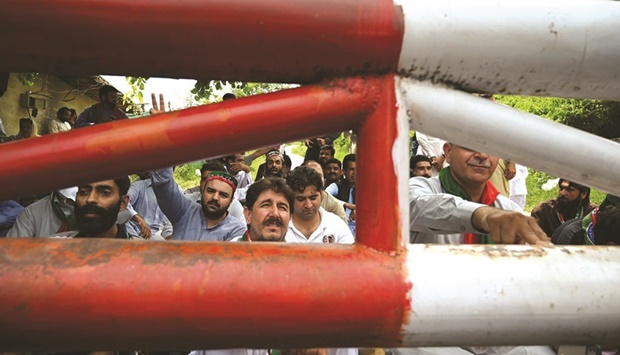Supporters of former prime minister Imran Khan gathered outside his home yesterday to prevent police from arresting him on anti-terrorism charges related to a weekend televised speech.
There was a low-key police presence outside Khan’s residence yesterday, with around 500 party supporters gathered.
Police filed charges against former cricket star Khan on Saturday over what they said was a threat in the speech in which he spoke about police torture of an aide who faces sedition charges for inciting mutiny in the military.
“We will not spare you,” Khan said in the speech, in which he named the police chief and the judge involved in the case against his aide. “We will sue you.”
Police cited that comment in a report seen by Reuters.
“The purpose of the speech was to spread terror amongst the police and the judiciary and prevent them from doing their duty,” police said in the report.
“I had called to take legal action against them (police officers and judicial magistrate),” Khan said, adding the government had nevertheless registered a terrorism case against him.
“All these things show that we don’t have rule of law in Pakistan,” he said, adding that he has 16 cases against him, in addition to this latest terrorism case.
“They will have to run over us before they can reach Khan,” supporter Sher Jahan Khan said outside Khan’s hilltop home overlooking the capital, Islamabad.
Mohamed Ayub said he had travelled overnight from Peshawar in the northwest to show support for Khan.
“We will protest and will block roads if Khan is arrested,” he told AFP.
“If Imran Khan is arrested ... we will take over Islamabad with people’s power,” a former minister in Khan’s cabinet, Ali Amin Gandapur, threatened in a post on Twitter.
Later in the day, a court granted Khan three days of pre-arrest bail, Khan’s lawyer, Babar Awan, told reporters, after which the protesters began to disperse.
Khan was prime minister from 2018 until April this year when he was forced to step down after losing a confidence vote in parliament.
Since then, he has been campaigning for new elections.
Khan appeared at the main gate of his home to wave to supporters, according to a tweet posted at the official page of his Pakistan Tehreek-e-Insaf (PTI) party.
Khan was not available for comment but Fawad Chaudhry, a spokesman for the PTI, dismissed the accusations against Khan as politically motivated, telling reporters they were being used to block Khan from leading anti-government rallies.
“Wherever you are, reach Bani Gala today and show solidarity with Imran Khan,” Chaudhry tweeted, referring to Khan’s home. “Imran Khan is our red line.”
The use of anti-terrorism laws as the basis of cases against political leaders is not uncommon in Pakistan, where Khan’s government also used them against opponents and critics.
Khan’s main goal is an early general election – the next one must be held before October next year – but the government has shown no sign of wanting to go to the polls as it grapples with major economic problems.
Khan rose to power in 2018 with what political analysts said was the support of the military and he won election on a conservative agenda that appealed to many middle class and religious voters.
However, under his rule the country’s economy went into free fall, and the International Monetary Fund suspended a $6bn loan programme that the new government has only just gotten back on track.
Analysts said Khan fell out with the military after a dispute over the appointment of a spy chief.
Khan denied ever having military support and the military, which has ruled the country for more than three decades of Pakistan’s 75-year history, denies involvement in civilian politics.
Political Analyst Hassan Askari Rizvi told AFP that filing the latest case against Khan was not symbolic, but rather a genuine attempt to stifle him.
“The government is using the state institutions to malign the opposition,” he said, adding ordinary Pakistanis were being hurt by the political wrangling. “The only thing left for the ruling party and the opposition is to malign each other. In the current situation, the real priority should be the economy so that the common man can get some relief.”
Over the weekend, Pakistan’s media watchdog banned television channels from broadcasting live addresses by Khan, saying he was “spreading hate”.
“His provocative statements against state institutions and officers ... is likely to disturb public peace and tranquillity,” the Pakistan Electronic Media Regulatory Authority said.

Supporters of former prime minister Imran Khan gather outside his residence in Islamabad.
